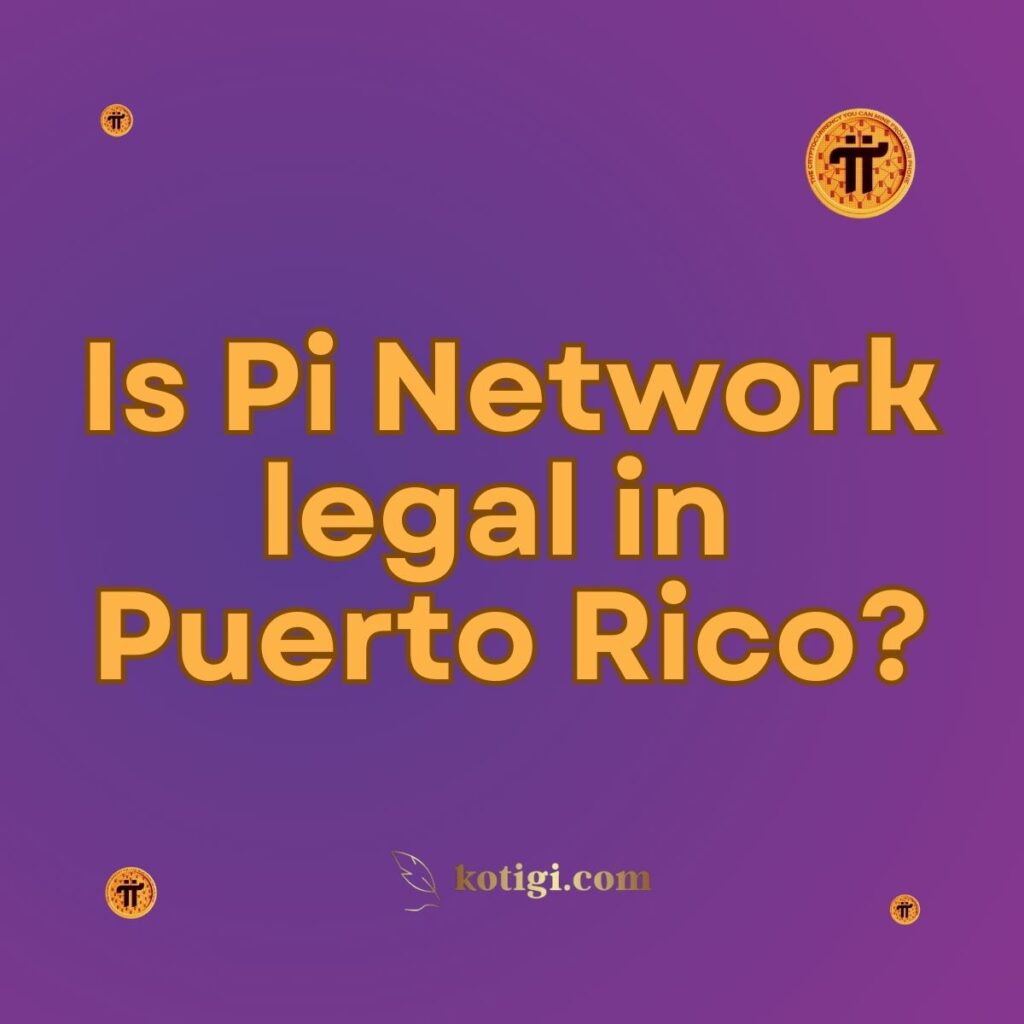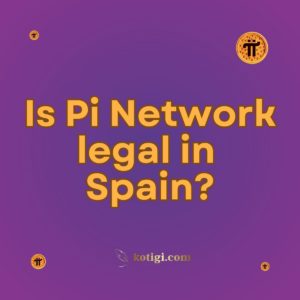
Is Pi Network legal in Puerto Rico?
Pi Network is currently legal in Puerto Rico, as the territory follows U.S. federal regulations concerning cryptocurrencies. While Puerto Rico does not have its own distinct set of cryptocurrency laws, users can engage with Pi Network as long as they comply with U.S. regulations on digital assets and taxes.
Introduction
With the growing popularity of Pi Network, many users in Puerto Rico are curious about its legal status and whether they can participate without violating any laws. Since Puerto Rico is a U.S. territory, it follows the federal regulatory framework for cryptocurrencies. In this article, we will explore the legality of Pi Network in Puerto Rico, how U.S. laws apply to the platform, and what users need to know about engaging with Pi Network in compliance with local and federal rules.
Cryptocurrency Regulations in Puerto Rico
U.S. Federal Laws Apply
As a territory of the United States, Puerto Rico follows U.S. federal regulations concerning cryptocurrencies. The U.S. government does not classify cryptocurrencies as illegal, allowing platforms like Pi Network to operate within the territory. The Securities and Exchange Commission (SEC) and the Commodity Futures Trading Commission (CFTC) oversee various aspects of cryptocurrency use, while the Internal Revenue Service (IRS) enforces tax reporting requirements.
For Pi Network users in Puerto Rico, this means that they are subject to the same regulations as users in the mainland United States. This includes compliance with tax laws, anti-money laundering (AML) requirements, and ensuring that the platform does not engage in securities fraud or other violations of U.S. financial regulations.
Puerto Rico’s Stance on Cryptocurrencies
Puerto Rico has become a hub for cryptocurrency entrepreneurs due to its favorable tax policies and business environment. While the territory does not have specific cryptocurrency laws distinct from U.S. federal regulations, its government has shown a generally positive stance toward digital assets. The tax incentives offered through programs like Act 20 and Act 22 have attracted blockchain businesses and investors, further encouraging the growth of the cryptocurrency ecosystem.
This environment allows platforms like Pi Network to flourish legally, provided they adhere to the overarching U.S. regulatory framework.
Taxation and Reporting Requirements
IRS Cryptocurrency Tax Guidelines
Pi Network participants in Puerto Rico are subject to U.S. federal tax laws, including those relating to cryptocurrencies. The IRS treats cryptocurrencies as property, meaning that any gains or losses from Pi Network activities—such as mining or trading Pi coins—must be reported on tax returns.
Puerto Rican residents who engage with Pi Network should be mindful of their tax obligations, especially as the platform transitions to its open mainnet phase, where Pi coins could potentially become tradeable. Participants will need to keep accurate records of their Pi transactions for tax reporting purposes, as failure to report cryptocurrency activities can result in penalties.
Act 20 and Act 22 Tax Incentives
One of the reasons Puerto Rico is popular among cryptocurrency investors is the availability of tax incentives through Act 20 and Act 22, which offer substantial tax benefits for residents who qualify. These acts provide favorable treatment for income derived from certain business activities, and many blockchain and cryptocurrency businesses have relocated to Puerto Rico to take advantage of these incentives.
Pi Network users who qualify under these acts may be able to benefit from reduced tax rates on any future earnings from Pi coins, provided they meet the residency and business requirements. However, it is important to consult with a tax professional to understand how these laws apply to individual situations.
Pi Network’s Compliance with U.S. Regulations
Anti-Money Laundering (AML) Requirements
Under U.S. law, cryptocurrency platforms are required to implement anti-money laundering (AML) measures to prevent the illicit use of digital assets. While Pi Network is not yet a fully tradeable cryptocurrency, it will need to ensure compliance with AML regulations as it transitions to its open mainnet. This means that any exchanges or trading platforms involving Pi coins must have robust identity verification processes and transaction monitoring systems in place.
Puerto Rican users of Pi Network should be aware that once the platform’s coins become tradeable, these AML requirements will apply. This could involve additional steps for users when it comes to identity verification and tracking transactions.
Consumer Protections and Risks
While Pi Network is legal in Puerto Rico, users should remain cautious when engaging with cryptocurrency platforms. The U.S. regulatory framework for cryptocurrencies is still evolving, and there are inherent risks associated with using digital assets. Pi Network users should ensure they understand the platform’s terms and conditions, as well as any potential risks, particularly as the platform develops and Pi coins become more widely used.
The Federal Trade Commission (FTC) also monitors consumer protections in the cryptocurrency space, ensuring that users are not exposed to fraud or misleading practices. Pi Network users should remain informed about their rights and the risks involved in using the platform.
The Role of Pi Network in Puerto Rico’s Digital Economy
Opportunities for Financial Inclusion
Pi Network’s mobile mining model presents an opportunity for broader financial inclusion in Puerto Rico, where many residents may not have access to traditional banking services or high-powered cryptocurrency mining equipment. By allowing users to mine Pi coins on their smartphones, Pi Network lowers the barrier to entry, enabling more people to participate in the growing digital economy.
This aligns with Puerto Rico’s efforts to attract cryptocurrency innovation and foster financial inclusion, particularly in underserved communities.
Potential for Business Growth
As Pi Network transitions to its mainnet and potentially introduces tradeable Pi coins, businesses in Puerto Rico may find opportunities to integrate the platform into their operations. The territory’s favorable tax environment and openness to digital assets create a fertile ground for blockchain-based businesses to thrive. Pi Network’s model of community-driven mining and participation could appeal to local businesses looking to leverage cryptocurrency for payments or transactions.
Regulatory Challenges and Future Developments
Evolving U.S. Regulatory Landscape
Although Pi Network is currently legal in Puerto Rico, the U.S. regulatory environment for cryptocurrencies is continuously evolving. The Securities and Exchange Commission (SEC), the Commodity Futures Trading Commission (CFTC), and other federal agencies are working to establish clearer guidelines for digital assets. Pi Network users in Puerto Rico should stay informed about any future regulatory changes that could impact the platform, especially as it moves toward enabling the trading of Pi coins.
Consumer Awareness and Protection
As the cryptocurrency space develops, consumer protection will continue to be a key focus for U.S. regulators. Pi Network users should be aware of the potential risks associated with participating in an unregulated cryptocurrency platform. While Pi Network is currently in its closed mainnet phase, where coins are not yet tradeable, users should remain cautious as the platform develops and introduces new features.
By staying informed about their rights and obligations under U.S. law, Pi Network participants in Puerto Rico can engage safely with the platform.
Conclusion
Pi Network is legal in Puerto Rico, operating under the U.S. federal regulatory framework that governs cryptocurrency use. While the territory does not have specific laws governing digital assets, Puerto Rico’s favorable tax environment and positive stance toward financial innovation create an encouraging space for platforms like Pi Network to operate. Users in Puerto Rico should be mindful of their tax obligations, reporting requirements, and potential future regulatory changes as the platform evolves.
As Pi Network transitions to its open mainnet and Pi coins become tradeable, it will be crucial for users in Puerto Rico to remain compliant with both U.S. federal laws and any local tax incentives they may qualify for under Acts 20 and 22.
Key Takeaways
- Legal Status: Pi Network is legal in Puerto Rico, operating under U.S. federal regulations that govern cryptocurrency use.
- Tax Reporting Obligations: Pi Network participants must report cryptocurrency activities to the IRS, as digital assets are considered property for tax purposes.
- Favorable Business Environment: Puerto Rico’s tax incentives, such as Act 20 and Act 22, make the territory a popular hub for cryptocurrency-related activities.
- Consumer Protection: U.S. federal agencies, including the SEC and FTC, provide oversight to protect consumers and ensure transparency in the cryptocurrency space.
- Evolving Regulations: Pi Network users in Puerto Rico should stay informed about potential changes in U.S. cryptocurrency regulations as the platform develops.





